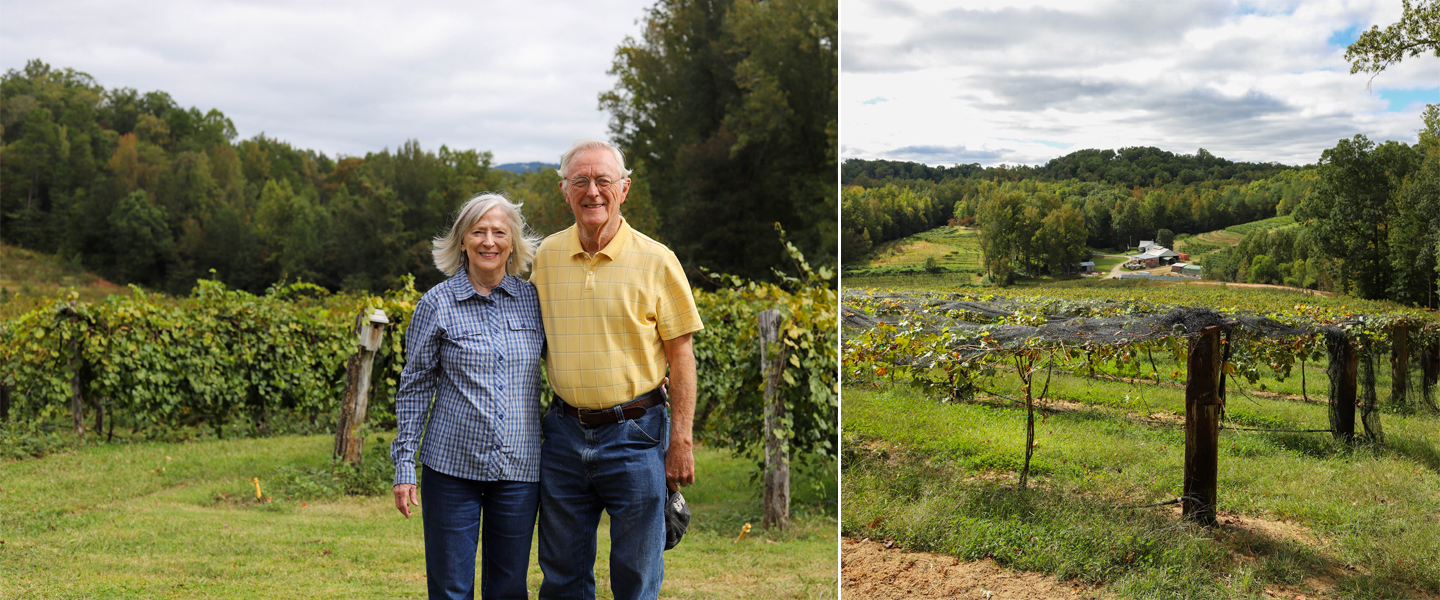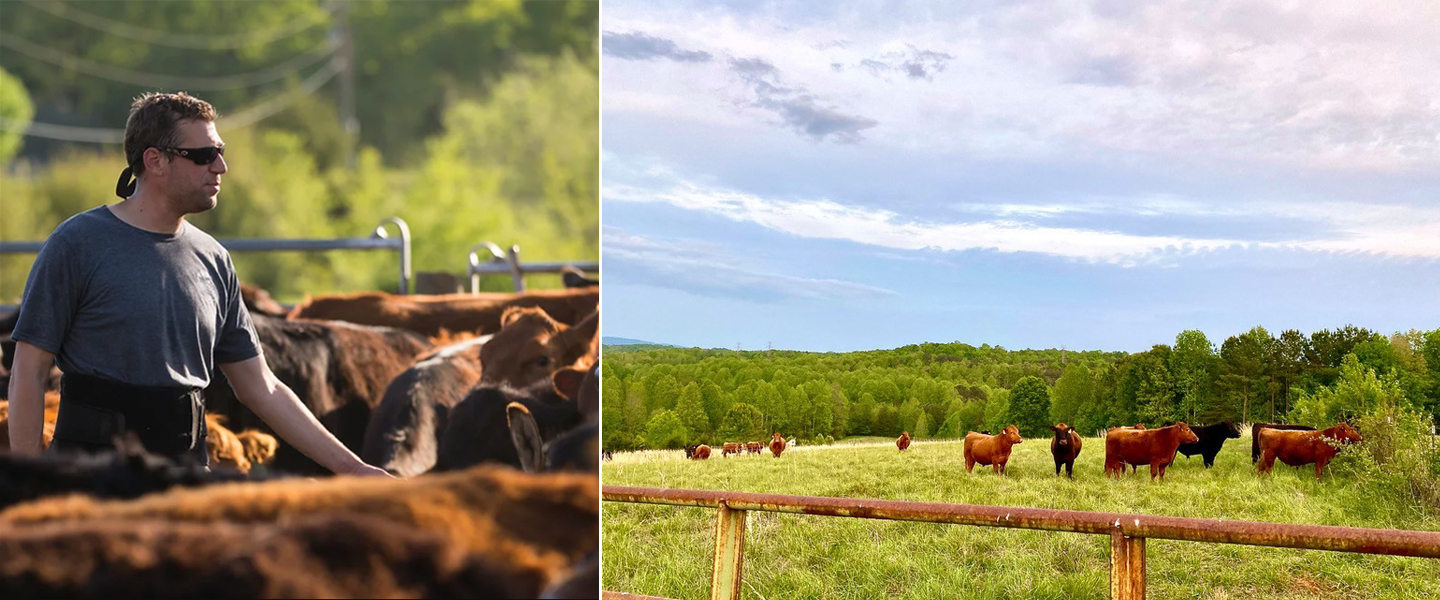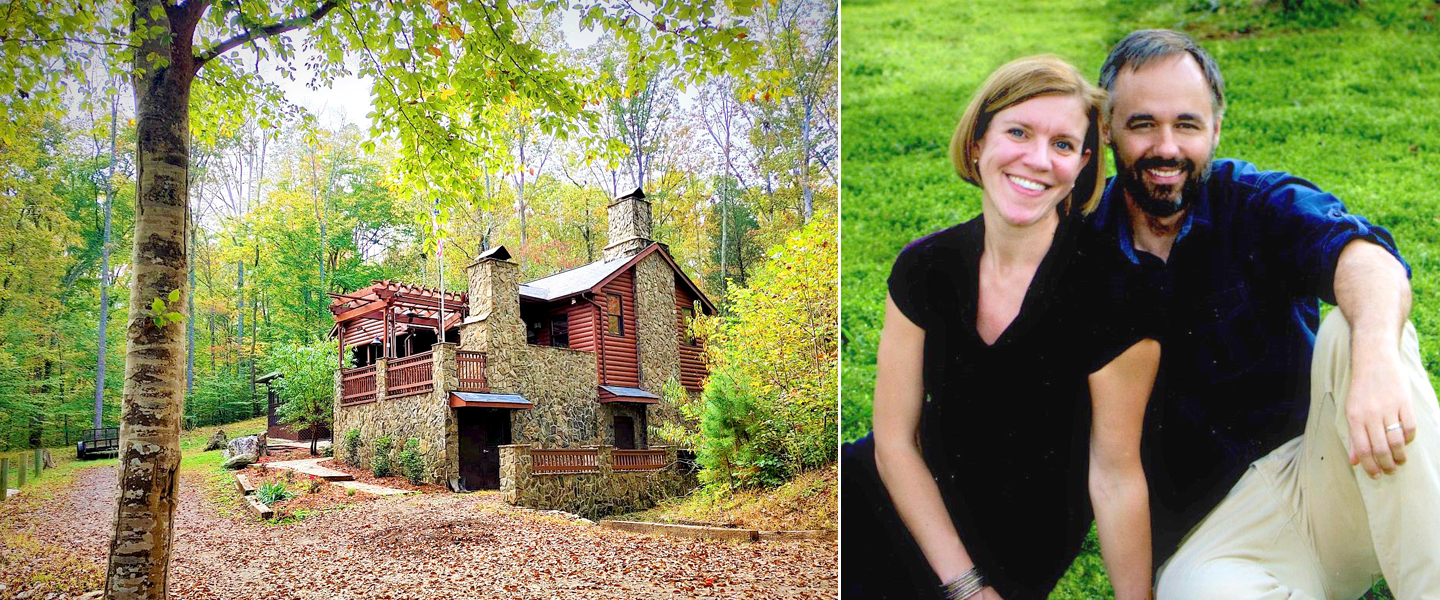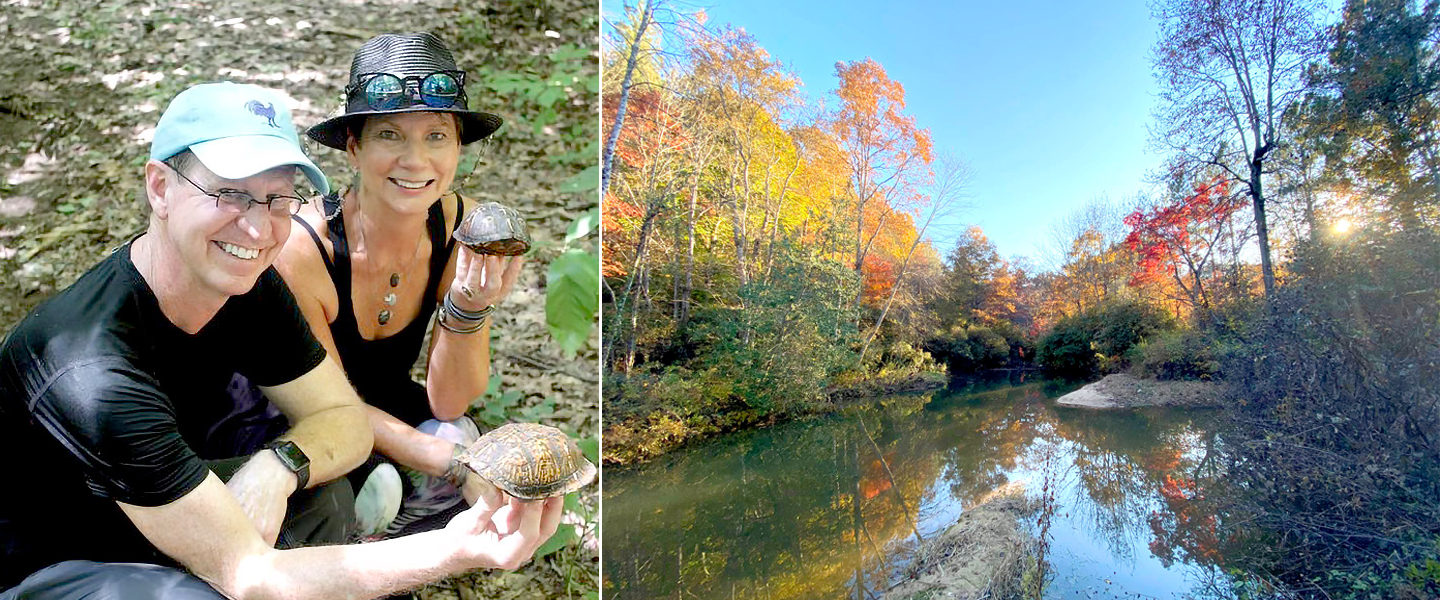Businesses thriving on conservation properties
November 11th, 2022
This is an excerpt from the Fall/Winter 2022-2023 issue of the Upstate Advocate, Upstate Forever's twice-yearly publication. To read a digital copy of the complete publication, please click here.
We spoke with four businesses who hold easements with Upstate Forever, and they told us how their protected property’s natural assets are bolstering their thriving businesses. From green burials, grass-fed beef farms, event venues and vineyards, local easement holders are proving how conservation and economic success work together in the Upstate.

Calico Vineyard
GREENVILLE COUNTY | 115 ACRES
Steve and Lantie Sandlin have been working with seeds and plants for most of their lives. For many years they ran a farm supply business until they were ready to begin their own farm. “Running a farm is just what I wanted to do,” Steve says. “It’s a natural move from selling fertilizers, seeds, and plants all your life to putting your own plants in.”
The Sandlins own and operate Calico Vineyard, a 115- acre farm in Travelers Rest, SC, named after their beloved cat, Calico. On roughly 15-20 acres, they grow grapes, blackberries, blueberries, muscadines, beans, strawberries, and more. This produce is available around the Upstate at local farmer’s markets, and they sell grapes to individual wine makers. Eventually, they plan to open the farm to the public to can come tour and pick fresh produce. Visitors to the property can also rent their farmhouse through Airbnb.
Steve was motivated to put his family property under easement when he saw how much of the Upstate was being developed. He’s been in the development business and thought he would take the initiative to put the land into easement.
“I want to preserve it like it is. It’s where my great grandfather lived, and my grandfather lived, and now where I live,” he says.
He knows the easement will protect his property and preserve the area’s natural resources forever. In the meantime, he enjoys working the land, viewing the area’s wildlife and spending time with his current cat, Julio.
Funding from the South Carolina Conservation Bank, Greenville Women Giving, and the South Carolina Department of Health and Environmental Control helped protect Calico Vineyard.
To learn more, visit calicovineyard.com

Greenbrier Farms
PICKENS COUNTY | 330 ACRES
"We have an understanding and ultimately an appreciation for what sustainable farmers and regenerative farming systems can do for an individual, group, and community at large,” says Roddy Pick of Greenbrier Farms. He co-owns Greenbrier Farms, a second-generation family-owned-and-operated farm spanning 330 acres, with his business partner Chad Bishop.
As advocates for regenerative agriculture, they are committed to sustainability and to humanely raising their cows and pigs. “People gravitate to that because they appreciate the health benefits of grass-fed, grass-finished beef and pastured pork,” says Roddy. "Most importantly, our customers help us advocate for regenerative farming practices all over our state and region because they believe we must respect and take care of our most precious asset — our land.”
When Roddy and Chad purchased the land, the property was already under easement, which allowed them to immediately start conversations with like-minded individuals and groups who were interested in what the farm could provide.
Not only does the farm offer grass-fed, grass-finished beef and pasture-raised pork, but they also provide privately grown, select produce for their restaurant Fork & Plough. There is also an event venue on the property for wedding and corporate event packages. And Upstate residents can visit the Farm on Thursday nights for Pizza Night, or they can join the annual Butcher Class and Spring Plant Sale, offering grown-from-seed produce starters, trees, and woody florals.
At Greenbrier Farms, the Pick and Bishop families have struck the right balance between business, sustainability, and conservation. "We have documented data from Furman showing that we are as bird diverse as places like Paris Mountain State Park and Conestee Nature Preserve,” notes Roddy. Their upland hardwood forest, grassland prairies, and wetlands provide much needed animal and insect habitat. “There is nothing like mornings on the farm when you witness the world around you awaken,” says Roddy.
Funding from the South Carolina Conservation Bank helped protect Greenbrier Farms.
To learn more, visit greenbrierfarms.com

Kings Mountain Preserve
CHEROKEE COUNTY | 36 ACRES
After almost 30 years in the funeral industry, Terry Robertson knows firsthand the importance of keeping the burial process as natural as possible. “I was embalming 200-300 people a year, and it nearly killed me,” he says. In 2000, he was diagnosed with cancer likely caused by his exposure to formaldehyde in the traditional embalming process.
Terry beat the odds, but it changed him. “After that, I stayed out of prep rooms and started focusing more on serving the families,” he says. “I found I spent a lot more time outside gaining an appreciation of nature.”
Terry and his wife Amanda own Kings Mountain Preserve, a green burial facility. Compared to a traditional burial — which may include disruptive and polluting elements like embalming fluid, vaults, concrete, steel, exotic hardwoods, and backhoes — a green burial has minimal impact on the environment. "It’s like your final footnote for mother nature, and a way to do it right for her,” says Terry.
Instead of being chemically embalmed, the body is refrigerated prior to burial. The family may bury their loved one in a wicker basket, a poplar casket, or pine casket, all of which are totally biodegradable.
Graves are hand dug — which ensures that the dirt is put back in the ground in the same order it was removed. The site is then marked with a native stone that the family can engrave if they wish. All in all, the green burial is less than half the price of a traditional burial in the counties Kings Mountain Preserve serves.
Loved ones return to visit King’s Mountain Preserve often, in part because of the serene, parklike setting. The property contains three miles of hiking trails where visitors can walk and see wildlife and lush greenery. Terry's favorite spot is a little waterfall off King’s Creek. “It makes you feel like you’re surrounded by life, not by death,” he says.
To learn more, visit kingsmountainpreserve.com

Ramsey Creek Preserve: Memorial Ecosystems
OCONEE COUNTY | 75 ACRES
Billy and Kimberley Campbell opened their natural burial business — Memorial Ecosystems, Inc.— at Ramsey Creek Preserve in 1998, and they’ve been serving the Upstate region ever since. Their business model thrives off the notion that they are literally and figuratively connecting people to the landscape.
Whether it’s a land trust or a family trying to save their farm, natural burials — the Campbells prefer that term over "green" burials — are an economically and environmentally viable way for land to produce income without selling it to developers. As Kimberley explains, “we need as many tools in the conservation toolbox as we can get, and this gives the land a purpose.”
Billy and Kimberley have used their property to develop many of the standards and techniques for natural burial, ranging from how to preserve the body without embalming to which native plants to incorporate into the landscape.
The Campbells have perfected methods for restoring previously zoned agricultural land to its natural state by bringing conservation science into the design process. Their online photo gallery showcases some of the 300+ species of native plants found at Ramsey Creek Preserve, one of which is a federally endangered wild cone flower.
Against the backdrop of this idyllic landscape, Billy and Kimberley are driven by their philosophy of community: “For us it’s always been extremely important to have this connection with the community, where this becomes a place where people can hike, picnic, have small weddings or baby blessings, or just a place to walk.”
Kimberley especially noticed an uptick in visitors during the pandemic when the parks closed. They remained open so the families could still visit their relatives. “Sometimes we all just need a quiet walk in nature,” she says.
To learn more, visit memorialecosystems.com
More about conservation burial sites
There are very few conservation burial sites in the Southeast; the Upstate is fortunate to have two such properties: Kings Mountain Preserve and Ramsey Creek Preserve. Both properties are protected by conservation easements held by Upstate Forever; in fact, in 2006, UF became the first organization in the world to hold a conservation burial easement when the Campbells chose to work with us to protect Ramsey Creek Preserve.

